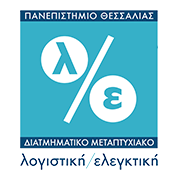Research Methodology 1
| SCHOOL | ECONOMIC AND ADMINISTRATIVE SCIENCES | ||||
| SECTION | ECONOMIC SCIENCES AND ACCOUNTING &
FINANCE |
||||
| LEVEL OF STUDIES | POSTGRADUATE STUDY PROGRAMME | ||||
| COURSE CODE | MSC0105 | SEMESTER OF STUDY | 1 | ||
| COURSE TITLE | RESEARCH METHODOLOGY I | ||||
|
INDEPENDENT TEACHING ACTIVITIES |
WEEKLY TEACHING HOURS | CREDIT UNITS | |||
| LECTURES | 3 | 6 | |||
|
TYPE OF COURSE |
REQUIRED |
||||
| PREREQUISITE COURSES: | NO | ||||
| LANGUAGE OF TEACHING AND
EXAMINATION: |
GREEK / ENGLISH | ||||
| THE COURSE IS OFFERED TO ERASMUS STUDENTS | NO | ||||
| ELECTRONIC COURSE PAGE (URL) | https://eclass.uth.gr/ | ||||
(2) LEARNING OUTCOMES
(1st PART) Upon successful completion of the course, the student will be able to:
- Understand and analyse the factors that constitute the methodological framework for the design and implementation of a research process
- Design and implement empirical research to investigate issues related to demand, consumption, trends and/or development policies
- Form the framework for the detection and structuring of research sources/data, either primary or secondary, in order to use them in research verification and analysis
- Develop adequately a research project
- Analyse and explain results through the use of statistical methods analysis
(2nd PART) Upon completion of the course the student will be able to:
- Understand the different theoretical approaches to the research process
- Clearly define a research question
- Identify the literature relevant to the research question and evaluate synthetically and critically the recorded research results in the form of literature review
- Know the alternative research techniques in order to design the most appropriate research methodology
(3) COURSE CONTENT
(1st PART) The main objective of this course is the presentation and analysis of the entire
theoretical and empirical framework for the design and implementation of scientific research. The starting point lies in the identification of the research process as the basis for the development and evolution of science both theoretically and empirically. In the context of the course, students penetrate the research subject, participate in research
practices and evaluate research results through the use of specific tools and data, both primary and secondary. The course uses a variety of applications and multiple case studies in order to achieve this primary objective.
More specifically, during the teaching of the course the following modules will be covered:
- Identifying the research process and the different forms of research
- Developing key parameters in the design of a research approach
- Design, development and implementation of a research process
- Objects, Subjects and potential markets in a survey
- Types and specificities of research approaches
- Research methods
- Ways, means and tools for implementing scientific research
- Exploration and analysis of data (primary and secondary)
- Questionnaires: utility and design
- Statistical Analysis – Sampling Methods (Simple and Stratified Sampling – Proportional Allocation of Sample and Neyman Allocation)
- Presentation I: Designing a research project
- Presentation II: Formulating a research article
- Evaluation of results
- Cases studies
(2nd PART) The purpose of this course is to provide students with the necessary skills to for the successful completion of a scientific research project, relevant to the subject of the postgraduate programme, the results of which will be invited to present in the context of their thesis. More specifically, during the teaching of the course the following modules will be covered:
- Objective and stages of the research process
- Τheory of science and research approaches
- Formulation of the research question
- Literature review
- Research design
- Research ethics
- Primary and secondary data
- Sampling procedures
- Data collection techniques
- Data preparation
- Analysis of qualitative and quantitative data
- Compilation and presentation of a research
(4) TEACHING and LEARNING METHODS – EVALUATION
| METHOD OF DELIVERY | On Site & Distance learning – Hybrid room | |||
| USE OF INFORMATION AND COMMUNICATION TECHNOLOGIES | Use of a hybrid room that includes a large
a wall-mounted screen on which the participants are presented remotely. The connection to the course is made through the Microsoft Teams software, in which a camera is connected to the course. in the room is recorded and illustrated by the teacher. The attendance of the course is also done with the use of the Wacom digital pen, which ensures the interactivity of the lesson with notes that appear directly on the students’ screen.
In addition, slides are projected, use of the an asynchronous education platform for the posting of course materials, students’ assignments and communication between lecturers and students, search for electronic journals and resources. |
|||
| ORGANISATION OF TEACHING | Activity | Semester workload | ||
| Lectures | 36 | |||
| Study, preparation and presentation of activities |
110 |
|||
| Study and analysis of the literature
(preparation of lectures & exams) |
31 |
|||
| Final written examination | 3 | |||
| Total Course |
180 |
|||
| STUDENT ASSESSMENT | Assessment is in Greek or in English and consists of written examinations at the end of the semester. | |||
(5) RECOMMENDED-BIBLIOGRAPHY
- Saunders, M., Lewis, P. and Thornhill, A. (2014) Research methods in business and economy, Biting
- Schnell, R., Hill, P.B. and Esser, E. (2014) Empirical social research methods, Referrer
- Dimitropoulos, (2009) Introduction to the methodology of scientific research, Hellenic
- Kaltsouni, N-H. (2006) ‘Empirical Research Methodology in Social Sciences’,
- Ghauri, and Gronhaug, K. (2010) Research methods in Business Studies, 4th Edition, Pearson
- Cooper, R. and Schindler, P.S. (2013) Business research methods, 12th Edition, McGraw-Hill Education (2Ο PART)
- Saunders, , Lewis, P. and Thornhill, A. (2014) Research methods in business and economy, Biting
- Schnell, , Hill, P.B. and Esser, E. (2014) Empirical social research methods, Referrer
- Bell, (2007) How to write a scientific paper. A guide to research writing, J. J. (2007). methodology, Metamihmio
- Zafeiropoulos, (2015) How is a scientific paper done?, 2nd Edition, Kritiki
- Dimitropoulos, (2009) Introduction to the methodology of scientific research, Hellenic
- Smith, (2014) Research methods in Accounting, 3rd Edition, Sage
- Greenlaw, S.A. (2005) Doing Economics: A Guide to Understanding and Carrying Out Economic Research, South-Western College
- Ghauri, and Gronhaug, K. (2010) Research methods in Business Studies, 4th Edition, Pearson
- Cooper, R. and Schindler, P.S. (2013) Business research methods, 12th Edition, McGraw-Hill Education
You may also like
Auditing I
(1) GENERAL SCHOOL SCHOOL OF ECONOMICS AND BUSINESS SECTION DEPARTMENT OF ECONOMICS AND DEPARTMENT OF ACCOUNTING & FINANCE LEVEL OF STUDIES POSTGRADUATE LEVEL COURSE CODE MSC0104 SEMESTER OF STUDY 1 …
Financial Accounting I
GENERAL SCHOOL SCHOOL OF ECONOMICS AND BUSINESS SECTION DEPARTMENT OF ECONOMICS AND DEPARTMENT OF ACCOUNTING & FINANCE LEVEL OF STUDIES POSTGRADUATE LEVEL COURSE CODE MSC0102 SEMESTER OF STUDY 1 COURSE …
FInancial Analysis I
GENERAL SCHOOL SCHOOL OF ECONOMICS AND BUSINESS SECTION DEPARTMENT OF ECONOMICS AND DEPARTMENT OF ACCOUNTING & FINANCE LEVEL OF STUDIES POSTGRADUATE LEVEL COURSE CODE MSC0101 SEMESTER OF STUDY 1 COURSE …

